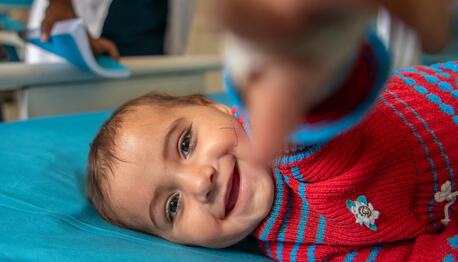
UNICEF Report: Humanitarian Action for Children 2024
Today's humanitarian needs are greater than ever. But emergency funding for lifesaving aid is not keeping pace with those needs. With the launch of its 2024 Humanitarian Action for Children appeal, UNICEF explains how it plans to build better futures and protect the rights of children living in conflict and crisis through transformative local partnerships — and why flexible donor support is more critical than ever.
UNICEF appeals for $9.3 billion from donors and supporters to reach 93.7 million children in 155 countries
The 2024 edition of UNICEF's annual Humanitarian Action for Children (HAC) sets an ambitious agenda to address major and multi-faceted challenges facing children and young people in today's increasingly hostile world.
The HAC report and action plan — UNICEF's response to unprecedented levels of humanitarian needs — includes an appeal for $9.3 billion to fund essential programs and interventions aiming to reach 93.7 million children in 155 countries.
Over the course of 2023, new and protracted conflicts coincided with other devastating crises — earthquakes, floods and other natural disasters; cholera and other disease outbreaks; increasing food insecurity and rising child malnutrition – while climate change continued to wreak havoc on young lives, causing severe droughts, heatwaves and more intense storms, the report notes.
UNICEF's 2024 action plan underscores the importance of local partners and strengthening local capacities to deliver lifesaving support and protection, and sustain impact. Working with community leaders, civil society groups and local and national NGOs to reach children and families in need in insecure, unstable environments has become more crucial than ever.
So has flexible funding — donations that come without restrictions — which allows UNICEF to act fast, respond to rapidly changing needs as they arise and prepare for future risks.
UNICEF's priorities for 2024 as outlined in the 2024 HAC include:
- HEALTH: 17.3 million children vaccinated against measles
- NUTRITION: 7.6 million children treated for severe acute malnutrition
- WASH: 52.4 million people accessing a sufficient quantity and quality of water for drinking and domestic needs
- EDUCATION: 19.3 million children accessing formal or non-formal education, including early learning
- CHILD PROTECTION: 26.7 million children, adolescents and caregivers accessing community-based mental health and psychosocial support, and 14.8 million women, girls and boys accessing gender-based violence risk mitigation, prevention and/or response interventions
- SOCIAL PROTECTION: 1.8 million households reached with UNICEF-funded humanitarian cash transfers
In launching its 2024 appeal, UNICEF highlighted several countries where the emergency response is critically underfunded and where children's needs remain urgent: Sudan, Burkina Faso, the Democratic Republic of Congo, Myanmar, Haiti, Ethiopia, Yemen, Somalia, South Sudan and Bangladesh. UNICEF has a specific humanitarian action plan, along with projected funding needs and program targets, for each of these countries.
Despite unprecedented needs in these and other crisis hot spots, and insecurity and logistical challenges in many increasingly dangerous and unstable contexts, UNICEF reached millions of children in 2023 with lifesaving services and support, the report also points out.
Learn more about UNICEF's impact in 2023 and the humanitarian action plan for 2024. Read the UNICEF HAC 2024 Overview